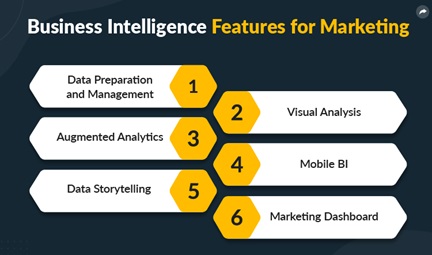Welcome to Ibex Analytics
- +14253899644
- 14121 Tukwila International Blvd, Tukwila WA 98168
- info@ibexanalytics.net
Welcome to Ibex Analytics

“Business intelligence” is the process of gathering, integrating, analyzing, and presenting data from a company to help people make better decisions. Analytics for marketing is a subset of business intelligence (BI) that focuses on analyzing marketing data to better understand and improve marketing strategy. This could mean looking at data about consumer demographics, behavior, and preferences, as well as data about how well marketing campaigns work, website traffic, and sales. This can also mean looking at data about sales.
Here are some of the ways that marketing analytics can be used:

Let’s look at some ways that using business intelligence in marketing can help you get the results your company wants:
Smart decision making
Every business needs to know exactly what their data is telling them. With the help of business intelligence, they can turn important information into insight that is organized and can be looked at. This makes business decisions that are better, which leads to more sales.
The goals of marketing
With the help of their business intelligence solutions, most companies are able to improve their marketing. They make it easier for their teams of salespeople and marketers to work together. Business intelligence (BI) makes it easier to see information about sales, which can help improve marketing efforts. When the sales and marketing teams work together on marketing, the projects end up being more profitable and successful than they would have been if they hadn’t worked together.
Deliver Outstanding customer experience
Marketers all over the world compete with each other based on how well they take care of their customers. Because of this, it is very important to know what the target audience does. Business intelligence gives companies information about their customers, which helps them divide their customer base into groups and figure out which customers bring in the most money. It also helps you find the right customers and reach the goals you’ve set for your business’s growth.
Increase output and efficiency
Business Intelligence can help get rid of inefficiencies caused by bottlenecks, automate jobs, improve processes, and put work in order of importance. Because of this, the company’s productivity as a whole goes up by a lot.
Compliance and Correctness of Data
Business Intelligence is a tool that helps companies figure out where their data is stored, what parts of that data are most important, and which employees need access to it. It helps organizations put all their data in one place and points out mistakes, both of which could cost them more money and hurt their reputations in a big way.
More money back from the investment
When all of the above conditions are met, the organization’s return on investment (ROI) goes up significantly. Performance may improve in all areas, including sales, how customers are treated, day-to-day efficiency, and plans for the future.
Conclusion
When businesses use business intelligence to market, they are better able to meet their clients’ needs. This could come in the form of a bigger selection of goods or better salespeople. Business intelligence is here to stay, and companies are spending a lot to train end users on business intelligence technologies to help them make decisions based on facts. This is done so that the business can compete with those that have already started using business intelligence. In conclusion, business intelligence and marketing analytics are linked. Business intelligence is the overall technology stack and infrastructure that is used to collect, integrate, and process data. Marketing analytics, on the other hand, is a specific use of BI that helps marketers make decisions.